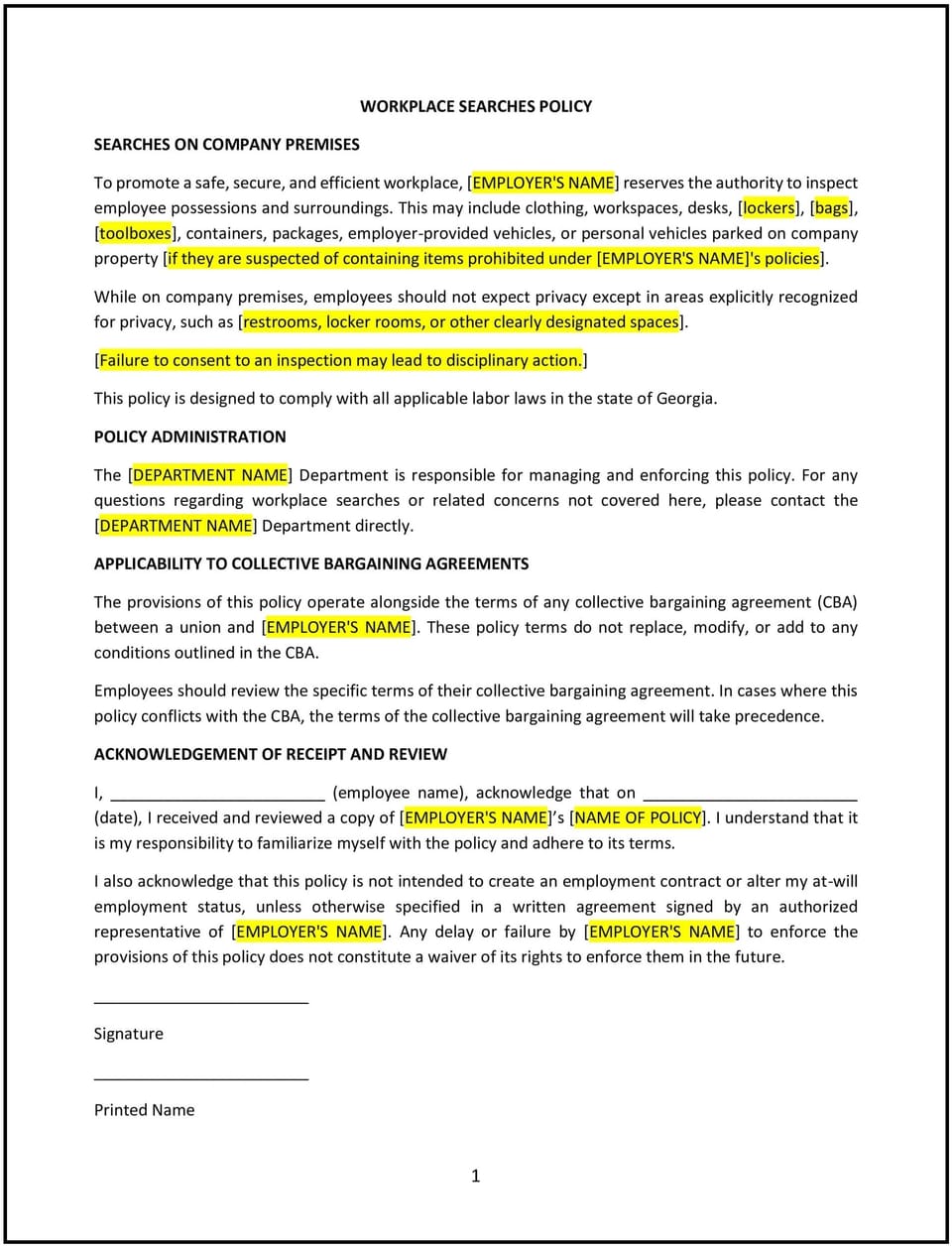Workplace searches policy (Georgia): Free template

Workplace searches policy (Georgia)
This workplace searches policy is designed to help Georgia businesses maintain a secure and productive work environment. The policy outlines the conditions under which searches may be conducted, the types of property subject to searches, and employee rights during the process.
By implementing this policy, businesses can protect company property, maintain safety, and prevent unauthorized activities.
How to use this workplace searches policy (Georgia)
- Define scope of searches: Clearly specify the areas and items subject to searches, such as desks, lockers, vehicles, or electronic devices provided by the company.
- Establish conditions: Outline the circumstances under which searches may occur, such as suspected misconduct, safety concerns, or routine checks.
- Communicate advance notice: Inform employees about the policy during onboarding and provide reminders periodically.
- Protect employee rights: Ensure searches are conducted respectfully and confidentially to minimize disruption or discomfort.
- Designate authorized personnel: Identify who has the authority to conduct searches, such as supervisors or security personnel.
- Document findings: Require detailed records of searches, including the reason for the search, items found, and outcomes.
- Review regularly: Periodically assess the policy to reflect changes in workplace needs, feedback, or Georgia-specific practices.
Benefits of using this workplace searches policy (Georgia)
Implementing this policy provides several advantages for Georgia businesses:
- Enhances security: Regular searches help prevent theft, unauthorized activities, or safety risks.
- Promotes transparency: Clear guidelines minimize misunderstandings and build trust among employees.
- Protects company assets: Searches help safeguard business property and confidential information.
- Reduces liability: Structured procedures help businesses address potential legal or safety risks effectively.
- Reflects Georgia-specific practices: Tailoring the policy to local norms and legal considerations ensures practicality and relevance.
Tips for using this workplace searches policy (Georgia)
- Communicate clearly: Share the policy with employees and emphasize its role in maintaining workplace security.
- Conduct training: Provide training for managers and authorized personnel on how to conduct respectful and lawful searches.
- Encourage transparency: Foster an open environment where employees understand the importance of workplace security.
- Avoid discrimination: Ensure searches are conducted impartially and do not target specific employees unfairly.
- Seek legal advice: Consult with legal professionals to ensure the policy aligns with Georgia-specific laws and regulations.
Q: What areas or items are subject to workplace searches?
A: Searches may include desks, lockers, company-provided vehicles, and electronic devices, as outlined in the policy.
Q: Under what circumstances can searches be conducted?
A: Searches can be conducted during investigations of suspected misconduct, routine security checks, or when safety concerns arise.
Q: Are employees required to consent to workplace searches?
A: Employees should be informed that by accepting employment, they agree to abide by the policy, which may include consent to searches.
Q: Who is authorized to conduct workplace searches?
A: Authorized personnel, such as supervisors or security staff, should conduct searches in accordance with the policy.
Q: How should businesses document workplace searches?
A: Businesses should keep detailed records of searches, including the reason, date, time, personnel involved, and any findings.
Q: How can businesses ensure searches are conducted respectfully?
A: Searches should be conducted privately, with minimal disruption, and in a manner that respects employee dignity and confidentiality.
Q: How often should this policy be reviewed?
A: The policy should be reviewed annually or as needed to reflect changes in Georgia workplace practices or legal standards.
This article contains general legal information and does not contain legal advice. Cobrief is not a law firm or a substitute for an attorney or law firm. The law is complex and changes often. For legal advice, please ask a lawyer.


